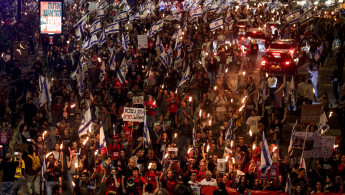Israeli security chief denounces anti-Netanyahu marches as protesters clash with police
The head of Israel's national security agency criticised the hundreds of Israelis taking part in anti-government protests on Wednesday, as domestic pressure on Israel's prime minister ramps up over the ongoing war on Gaza.
Hundreds of anti-government protesters have been taking to the streets of west Jerusalem over the past three days, calling for general elections and the release of the captives in Gaza.
Shin Bet chief Ronen Bar warned the protesters that there was a "clear line" between legitimate protest and "violent and illegal protest" in a public statement on Wednesday, following a night of clashes between protesters and police.
Groups of activists, including relatives of the captives held in Gaza, clashed with police outside Prime Minister Benjamin Netanyahu's residence in occupied Jerusalem.
Some of the protesters broke through metal barricades in altercations on Tuesday night.
Five people were arrested, while one police officer was taken to hospital after a demonstrator threw a metal barricade towards him, local police said.
'Threat to public security'
The chaotic scenes triggered the head of Israel’s domestic intelligence service to issue a statement denouncing the protests as a threat to public security.
"The violent discourse online and some of the scenes we saw tonight in Jerusalem, go beyond acceptable protest, harm the ability to maintain public order, could lead to violent clashes with law enforcement, disrupt their ability to carry out their work and even cause harm to individuals under protection," Bar said.
He called the protests a "worrying trend that could lead to dangerous places which we must not come to".
Pro-democracy activist groups and relatives of the captives in Gaza have organised four days of protests to pressure Netanyahu to step down, as the public loses faith in his ability to ensure the safe return of around 130 captives held in Gaza.
If Netanyahu thinks these protesters are going away, he’s wrong. Bring the hostages home. Elections now. Jerusalem tonight. Video by Bar Peleg. pic.twitter.com/y598ocgTyK
— Ami Dar (@AmiDar) April 2, 2024
Footage showed hundreds of people carrying Israeli flags, flame-lit torches, and banners marching down the street.
One person held a banner reading "Bibi is a degenerate" in reference to Netanyahu, while others called for the release of the captives.
Police forces sprayed water cannons and skunk liquid towards the protesters outside Netanyahu’s home, according to Israeli media reports.
One video shared online by Haaretz reporter Nir Hasson showed Ayala Metzger, daughter in law of Yoram Metzger a captive held by Hamas, being manhandled by police after she refused to leave the area.
שוטרים גוררים את אילה מצגר, כלתו של יורם מצגר החטוף בעזה, במהלך הצעדה לשחרור החטופים והחלפת נתניהו ליד בית ראש הממשלה. pic.twitter.com/pN1kem4frZ
— نير حسون Nir Hasson ניר חסון (@nirhasson) April 2, 2024
Israeli leaders have been under increasing internal pressure following the Hamas led attack on southern Israel on 7 October, which was considered a major intelligence failure.
The military has also only managed to bring back a handful of captives in Gaza, struggling to determine the fate of the remaining 130.
Former prime minister Ehud Barak gave a speech at the beginning of Tuesday's demonstration in which he criticised Netanyahu and said he was "sacrificing the hostages on the altar of total victory".
Barak called for further demonstrations and a "shutdown of the entire country".
The protests were denounced by political and security leaders, including senior minister Benny Gantz who called for unity.
Defence Minister Yoav Gallant said the protest "endangers our security and even more so our unity, which is critical to our existence".
Hard line National Security Minister Itamar Ben-Gvir criticised the security service, for not protecting the prime minister's home.
"A situation in which thousands of people break through barriers near the prime minister’s home and the Shin Bet turns a blind eye is unacceptable," he wrote on X.
Last year, Israel saw a wave of pro-democracy demonstrations in response to Netanyahu's controversial judicial reforms, which were seen as handing power to the government and away from the courts.





 Follow the Middle East's top stories in English at The New Arab on Google News
Follow the Middle East's top stories in English at The New Arab on Google News


